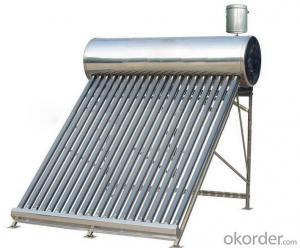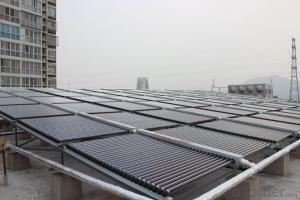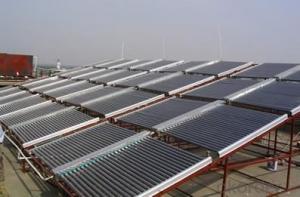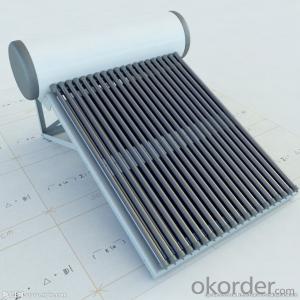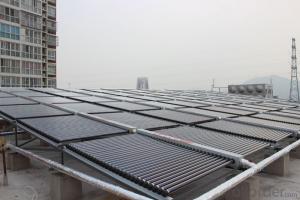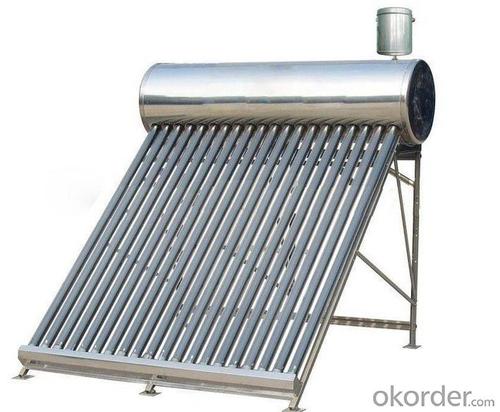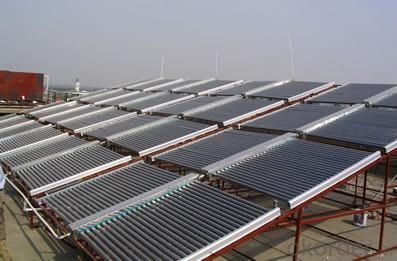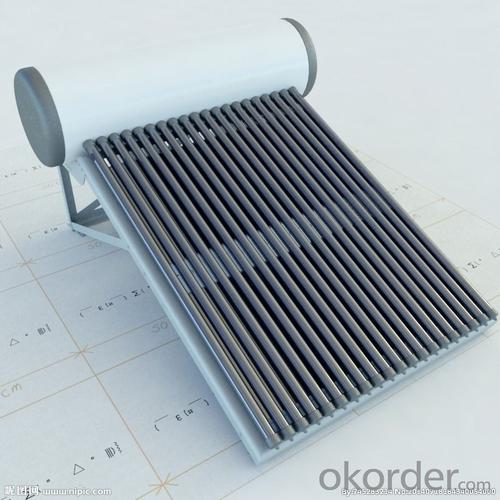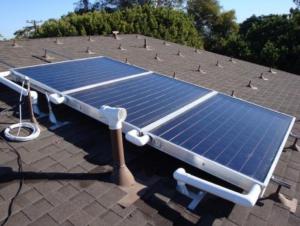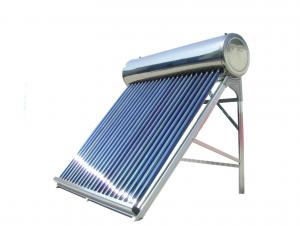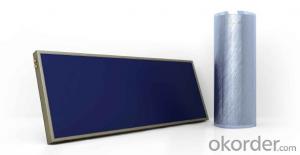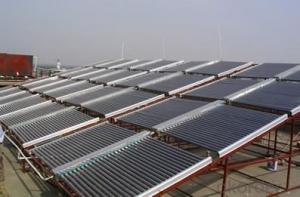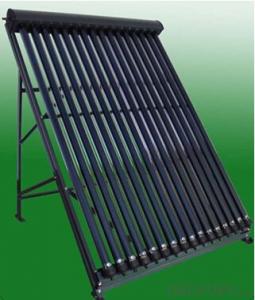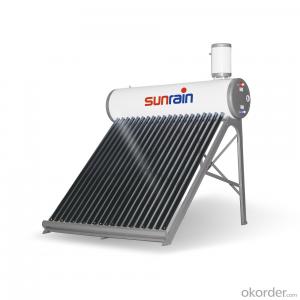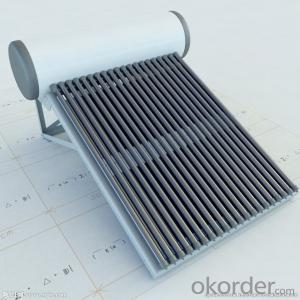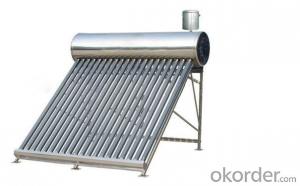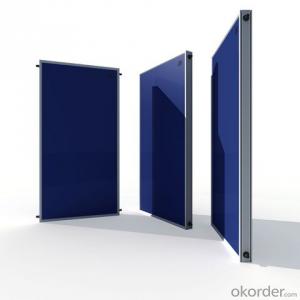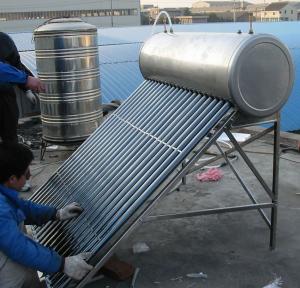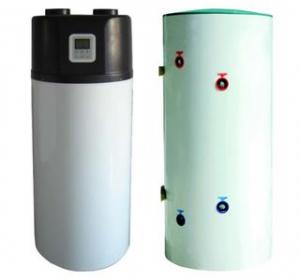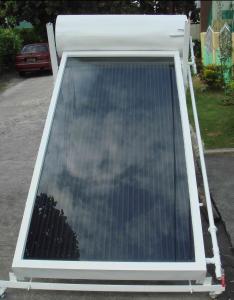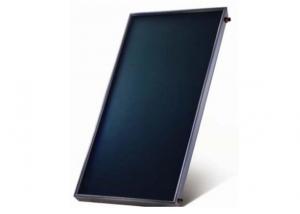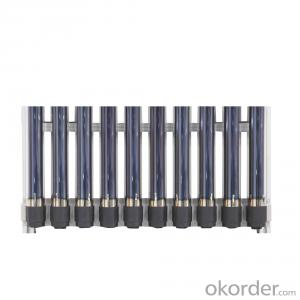30-Tube Non-Pressure Solar Collector with Solar Water Heater Storage Tank
- Loading Port:
- China main port
- Payment Terms:
- TT OR LC
- Min Order Qty:
- 10 set
- Supply Capability:
- 10000 set/month
OKorder Service Pledge
OKorder Financial Service
You Might Also Like
Solar water heaters features
1. The upright tank can make the water temperature to a high level. It can hot the water instantly
2. The tank inside the building, the hot water loses less energy than the normal one
3. The solar collector and the tank of solar water heater is separated, that makes the system combine with the building perfectly, which will reduce the sightseeing for the building and environment around
4. Back up with electric heater so that in the day without sunshine hot water can also be used
5. Can be combined with gas or electric heater
6. Max. Pressure: 12bar; Operating Pressure: 6 bar
7. It can be used for other function, such as warming
Solar water heaters working principle
1. The solar collector absorbs solar energy and transmits it to the solar water heater tank through circulation
2. When the temperature of the collector reaches the set value, the controller starts the circulation pump automatically
3. The circulation pump makes heat-conducting liquid circulate automatically
4. The heat-conducting liquid transfers heat to water by lower heat exchanger in the water tank.
5. When the temperature difference between solar collector and heat pipe solar water heaters tank doesn't reach the set value, the circulation pump will be shut automatically
6. In case the temperature of the water tank does not reach Tmax, Electric Heating Element will start to work automatically
Solar water heaters working station component:
1. Operating screen
2. Manometer
3. Pump speed adjust switches
4. Temperature difference circulation pump
5. Flow rate indicator
6. Return circuit connector
7. Safety valve
8. Expansion vessel connector9. Return circuit connector
10. Wall mounting
11. Expansion vessel:8L
12. Pressure resistance: 10 bar pressure for expansion vessel
Solar water heaters specification:
Description | solar water heaters |
Material of out manifold | 0.55mm thickness color steel/ fluorine carbon steel |
Material of inner tank | Food grade 2.0 mm thickness SUS304 stainless steel |
Tank insulating layer | 40mm 45kg/m³ high-density polyurethane foamed |
Inlet and outlet hole | Male G1'' |
Max pressure | 0.6 Mpa |
Solar collector tube | 3.3 Borosilicate glass with N/Al coating |
Thickness of glass tube | 1.6mm |
Vacuum tube tightness | P≤0.005 Pa |
Absorption | as=0.93-0.96 (AM1.5) |
Emission ratio | εh=0.04-0.06 (80C±5C) |
Idle sunning property parameters | Y=220~260m2.C/KW |
Average heat loss coefficient | ULT=0.6~0.7W/(m2.C) |
Bracket: | 2.0mm thickness aluminum alloy |
Tank weight | 75KGS |
Tank size | 560mm Dia x 1810mm Height |
Tank capacity | 300L |
Solar collector | 2pcs 58x1800x15tube solar collector |
Absorber area | 2.811 m² |
Working station | SP116 working station |
Heat exchanger length | Upper:12m, Underside:18m |
Solar water heaters details show:
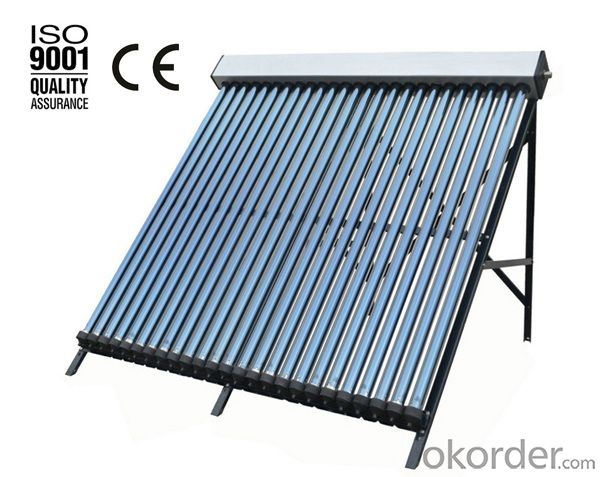
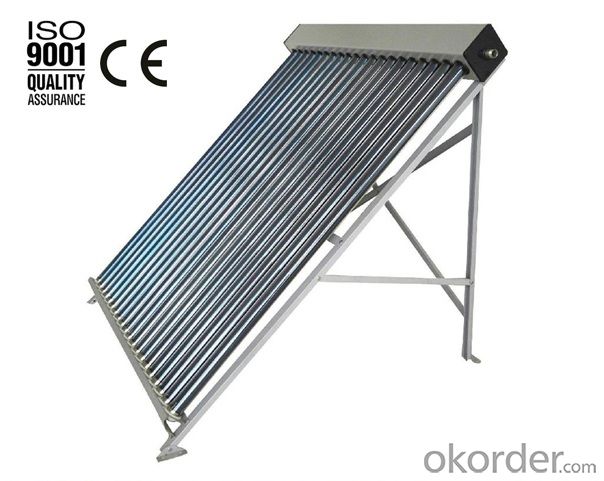
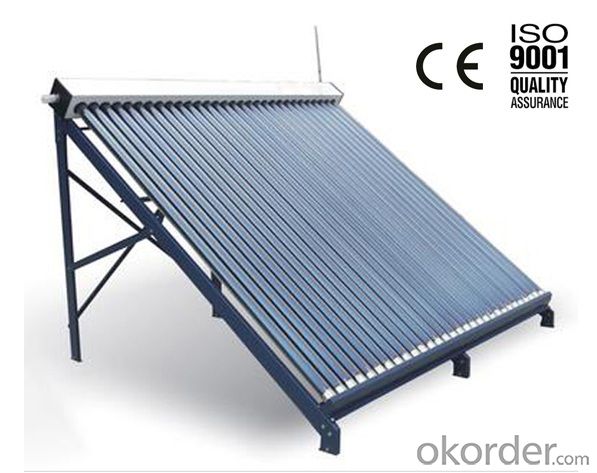
Benefits of this kind of solar water heaters:
1. Prolong the life of your existing water heater
2.Costs less than an electric, gas or oil water heater
3.No maintenance required
4.Lasts longer than a traditional hot water heater
5.Reduce your water heating costs
- Q: What is the average lifespan of the solar panels used in a solar water heater?
- The average lifespan of solar panels used in a solar water heater is typically around 20 to 25 years.
- Q: Can a solar water heater be used in areas with limited access to reliable electricity supply or grid connectivity?
- Yes, a solar water heater can be used in areas with limited access to reliable electricity supply or grid connectivity. Solar water heaters rely on sunlight to heat water, so they do not require a constant supply of electricity. This makes them an excellent option for areas where access to electricity is limited or unreliable. By harnessing the power of the sun, solar water heaters can provide a sustainable and cost-effective solution for heating water in such areas.
- Q: How does a solar water heater impact water conservation efforts?
- A solar water heater positively impacts water conservation efforts by reducing the need for traditional energy-intensive water heating methods. By harnessing the power of the sun, solar water heaters heat water without consuming additional resources, thus minimizing water wastage. This technology helps promote sustainable practices and reduces the overall water consumption in households or businesses, contributing to water conservation efforts.
- Q: Are solar water heaters suitable for commercial buildings?
- Yes, solar water heaters are suitable for commercial buildings. They can provide a cost-effective and sustainable solution for meeting the hot water demand of businesses, hotels, hospitals, and other commercial establishments. Solar water heaters can significantly reduce energy costs, lower carbon emissions, and contribute to a greener and more environmentally friendly commercial infrastructure.
- Q: How does a solar water heater affect the hot water supply during cloudy days?
- A solar water heater's hot water supply is affected during cloudy days as it relies on sunlight to heat the water. When there is limited or no sunlight, the solar water heater's efficiency decreases, resulting in a lower hot water supply.
- Q: Can a solar water heater be used in areas with strict building codes?
- Yes, a solar water heater can be used in areas with strict building codes. However, it is important to ensure that the solar water heater meets all the necessary requirements and regulations specified by the building codes. This may involve obtaining permits, adhering to specific installation guidelines, and meeting safety standards. Working with a professional installer who is familiar with the local building codes can help ensure compliance and a successful installation.
- Q: Can a solar water heater be used in areas with high levels of air pollution from vehicular emissions?
- Yes, a solar water heater can still be used in areas with high levels of air pollution from vehicular emissions. While air pollution can have negative effects on overall air quality, it does not directly impact the functionality of a solar water heater. Solar water heaters rely on the energy from the sun to heat water, and as long as there is sufficient sunlight reaching the solar panels, the system will work effectively. However, it is important to note that air pollution can indirectly affect the performance of solar water heaters. High levels of air pollution can reduce the amount of sunlight reaching the solar panels, thus decreasing the efficiency of the system. This can result in reduced heating capacity and potentially longer heating times. To mitigate the impact of air pollution, regular cleaning and maintenance of the solar panels is crucial. Dust, dirt, and pollutants from the air can accumulate on the panels, blocking sunlight and reducing efficiency. Regular cleaning will help to ensure optimal performance. Additionally, in areas with high air pollution, it may be necessary to install solar water heaters with anti-pollution measures. These measures can include dust filters, coatings to repel pollutants, or even positioning the solar panels at an angle to minimize the impact of air pollution. In conclusion, while air pollution from vehicular emissions can indirectly affect the performance of solar water heaters by reducing the amount of sunlight reaching the panels, they can still be used in areas with high levels of air pollution. Regular cleaning and maintenance, as well as the implementation of anti-pollution measures, can help to ensure optimal performance in such areas.
- Q: Can a solar water heater be used in areas with limited access to clean water?
- Yes, a solar water heater can be used in areas with limited access to clean water. While a solar water heater primarily heats water using energy from the sun, it does not necessarily guarantee access to clean water. However, in areas with limited access to clean water, a solar water heater can still be beneficial as it reduces the reliance on traditional fuel sources, such as wood or coal, for water heating. This, in turn, can help alleviate environmental issues and reduce health risks associated with indoor air pollution. Nonetheless, ensuring access to clean water remains a separate challenge that must be addressed through other means, such as water purification systems or improved infrastructure.
- Q: Can a solar water heater be used in areas prone to freezing temperatures?
- Yes, a solar water heater can be used in areas prone to freezing temperatures. However, in these regions, precautions need to be taken to prevent damage to the system due to freezing. Solar water heaters typically use antifreeze or a heat transfer fluid to prevent the water from freezing inside the system. This fluid circulates through the solar collector, absorbing heat from the sun and transferring it to the water storage tank. The antifreeze or heat transfer fluid is designed to have a lower freezing point than water, ensuring that it remains in a liquid state even in freezing temperatures. Additionally, solar water heaters in cold climates often incorporate freeze protection mechanisms such as insulation, insulated pipes, and temperature sensors that activate backup heating systems when temperatures drop too low. By implementing these measures, solar water heaters can effectively operate in areas prone to freezing temperatures and provide hot water even during winter months.
- Q: How long do you need to deal with solar water heater in summer?
- If the exhaust is OK, once the exhaust is not smooth, too much pressure will cause the water tank is inflated, and will accumulate scale, which will lead to shorten the life of the tank.
Send your message to us
30-Tube Non-Pressure Solar Collector with Solar Water Heater Storage Tank
- Loading Port:
- China main port
- Payment Terms:
- TT OR LC
- Min Order Qty:
- 10 set
- Supply Capability:
- 10000 set/month
OKorder Service Pledge
OKorder Financial Service
Similar products
Hot products
Hot Searches
Related keywords
